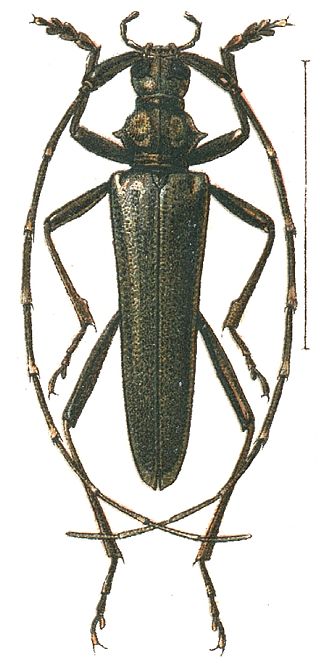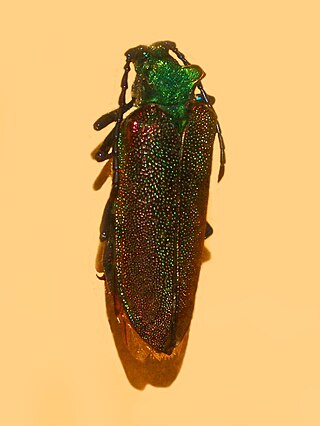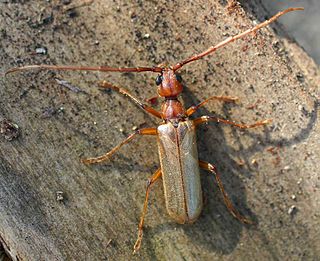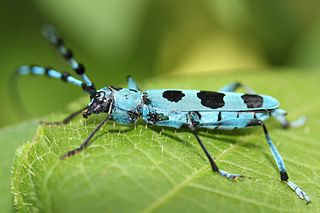
The longhorn beetles (Cerambycidae), also known as long-horned or longicorns, are a large family of beetles, with over 35,000 species described.

The Prioninae are a subfamily of Cerambycidae. They are typically large (25–70 mm) and usually brown or black. The males of a few genera sport large mandibles that are used in fights with other males, similar to stag beetles. These beetles are commonly nocturnal and are attracted to light. The majority of the Prioninae whose biology is known are borers whose larvae feed on rotting wood or roots.

Per Olof Christopher Aurivillius was a Swedish entomologist.

Lamiinae, commonly called flat-faced longhorns, are a subfamily of the longhorn beetle family (Cerambycidae). The subfamily includes over 750 genera, rivaled in diversity within the family only by the subfamily Cerambycinae.

The Disteniidae are a small family of beetles in the superfamily Chrysomeloidea, traditionally treated as a group within the Cerambycidae.

The Oxypeltidae are a small family belonging to the superfamily Chrysomeloidea, widespread in the Andean region of Chile and Argentina. They have traditionally been considered a group within the Cerambycidae.

The Vesperidae are a small family of beetles, normally classified within the family Cerambycidae, of heterogeneous aspect but all characterised by larval stages related to roots of herbaceous plants or trees

Cerambycinae is a subfamily of the longhorn beetle family (Cerambycidae). The subfamily has a world-wide distribution including: Asia, Europe and the Americas. Within the family, the only subfamily of comparable diversity is the Lamiinae.

Lepturinae, the lepturine beetles, is a subfamily of the longhorn beetle family (Cerambycidae), containing about 150 genera worldwide. This lineage is most diverse in the Northern Hemisphere. Until recently the subfamily Necydalinae was included within the lepturines, but this has been recently recognized as a separate subfamily. Nine tribes are usually recognized today, with a tenth, Caraphiini, created in 2016. A few genera are of uncertain placement within the subfamily.

Stephan von Breuning was an Austrian entomologist who specialised in the study of beetles (coleopterology), particularly within the longhorn family (Cerambycidae).

Callidiini is a tribe of beetles in the subfamily Cerambycinae, containing the following genera:

Compsocerini is a tribe of beetles in the subfamily Cerambycinae, containing the following genera:

Rhopalophorini is a tribe of beetles in the subfamily Cerambycinae, containing the following genera:

Trachyderini is a tribe of long-horned beetles in the family Cerambycidae. There are at least 140 genera and 650 described species in Trachyderini.
Lepturgantes is a genus of beetles in the family Cerambycidae, containing the following species:
Calliini is a tribe of longhorn beetles of the subfamily Lamiinae.

Colobotheini is a tribe of longhorn beetles of the subfamily Lamiinae.

Mesosini is a tribe of longhorn beetles of the subfamily Lamiinae.

Onciderini is a tribe of longhorn beetles of the subfamily Lamiinae, they are prevalent across Europe in nations such as Turkey, and Finland.
Dmytro Zajciw was a Ukrainian and Brazilian entomologist, notable for his collection and for his many beetle discoveries. He was born in Velyka Mykhailivka, Ukraine and died in Rio de Janeiro, Brazil. He was the author of Two new genera and species of neotropical Longhorn beetles , 1957, Contribution to the study of Longhorn beetles of Rio de Janeiro , 1958, and was the first to describe the genera Adesmoides and Pseudogrammopsis, as well as the species Beraba angusticollis and Mionochroma subaurosum, among many others.
















